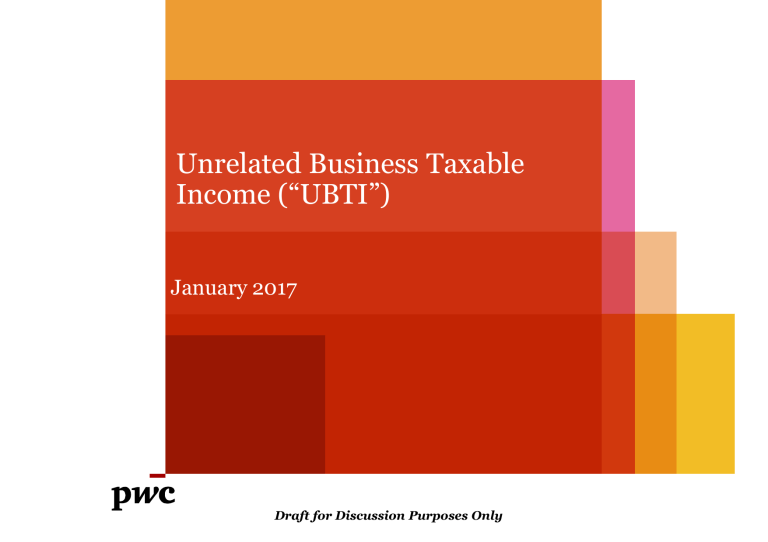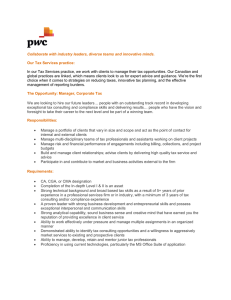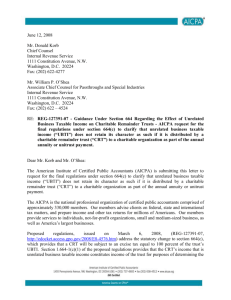
Unrelated Business Taxable Income (“UBTI”) January 2017 Draft for Discussion Purposes Only Overview of UBTI • Internal Revenue Code (“IRC”) Section 501 grants tax exempt status to a variety of tax-exempt and mutually beneficial organizations. • UBTI was enacted in 1950 to ensure that tax- exempt entities do not unfairly compete with taxable companies in profitgenerating activities. • UBTI is income from a trade or business regularly carried on by an exempt organization that is not substantially related to the organization’s exempt purpose PwC Israel 2 Overview of UBTI – VC / PE angle • The Code provides that most forms of passive income will not be treated as UBTI. Passive income includes, among other: Capital gains, Dividends interest • Passive income that is derives from asset that is subject to acquisition indebtedness will be generally treated as UBTI. Acquisition indebtedness is debt incurred in connection with the purchase of the property, whether the indebtedness is incurred before, after, or at the time of the acquisition. PwC Israel 3 Acquisition indebtedness –common pitfalls • Administrative convenience • Borrowing exclusively to pay expenses • Defer payment of management fees Passive income generated will be generally treated as UBTI, unless paid within a very short term. If not paid in short term, will likely to fall under acquisition indebtedness general rule. • General rule: any liability, that is reasonably foreseeable at the time of asset acquisition, will fall into the acquisition indebtedness rules. PwC Israel 4 Overview of UBTI UBTI is calculated as follows: Average acquisition indebtedness Average adjusted basis of property Gross income from property = Important : Property considered debt-financed if acquisition indebtedness existed at any time during the tax year or the 12 months preceding the sale of the property PwC Israel 5 UBTI calculation The Fund received $200 worth of dividend. The Fund’s UBTI income is: 112.50 490 X $200 = $46 1/1 2/1 3/1 4/1 5/1 6/1 7/1 8/1 9/1 10/1 11/1 12/1 Line of credit 100 110 100 90 80 110 150 160 120 100 110 120 Total Debt 100 110 100 90 80 110 150 160 120 100 110 120 4/1 5/1 6/1 7/1 8/1 9/1 10/1 11/1 12/1 Total Average Indebtedness (112.50) 1/1 2/1 3/1 Book Cost Investment 1 Investment 2 Investment 3 Investment 4 150 120 120 120 150 120 120 120 150 120 120 120 150 120 120 120 150 120 120 120 150 120 120 120 150 120 120 120 150 120 120 120 150 120 120 120 150 120 120 120 150 120 120 - 150 120 120 - Total Tax Basis 510 510 510 510 510 510 510 510 510 510 390 390 Total Average Adjusted Basis PwC Israel 490.00 6 Avoiding UBTI – what a fund to do? • Guaranty of Debt The Fund guarantees the loan and as long as the fund is not the true borrower it may reduce UBTI issue. • Pre – Fund Allows a Fund to offer tax-exempt limited partners the ability to "preFund" their capital contributions prior to a borrowing. • Opt - out The Fund gives the exempt LPs the right to "opt-out" of the participation in the debt-financed investment. • Corporate and offshore blockers Blockers are commonly used where investments are intended to be leverage. PwC Israel 7 UBTI – Using Tax exempt blocker • Tax exempt entities may hold their interests via a foreign corporation. • Foreign corporation may generally be a foreign partnership elected to be treated as corporation for US income tax purposes. • Tax exempt organizations that are shareholders of CFC / PFIC generally should not be subject to Subpart F rules (Blocker Corporation). Tax Exempt Investors Taxable Investors Blocker Corporation VC / PE Third Party Investors Bank Loans SPV Dividend Target PwC Israel Draft for Discussion Purposes Only Fund obligation • LPA agreement • Side letter • Investor relationship PwC Israel 9 Fund reporting obligation • Identify tax investor partner – generally by obtaining W-9 form. • Partnerships should use Schedule K-1, box 20, code V, to report UBTI information. PwC Israel 10 Thank you © 2016 Kesselman & Kesselman. All rights reserved. In this document, "PwC Israel" refers to Kesselman & Kesselman, or, as the context requires, PricewaterhouseCoopers Advisory Ltd. or PwC Trust Company (1971) Ltd., which are member firms of PricewaterhouseCoopers International Limited, each member firm of which is a separate legal entity This content is for general information purposes only, and should not be used as a substitute for consultation with professional advisors





